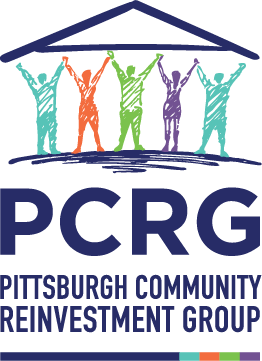PITTSBURGH COMMUNITY REINVESTMENT GROUP
+ Mission
PCRG was organized in 1988 as a coalition of community-based organizations to provide a coordinated response to the bank practice of “redlining” – the refusal of conventional mortgage credit in low-income communities. Using the Federal Community Reinvestment Act of 1977 (CRA) allowed PCRG to develop working relationships with 15 institutions and Pittsburgh’s Urban Redevelopment Authority, producing special home purchase mortgage programs, home improvement loan programs, and commercial lending products dramatically increased access to credit for low-income communities.
Recognizing that their collective voice would be stronger than their individual voices, community groups across Pittsburgh came together in 1988 to advocate for holistic reinvestment in the city’s neighborhoods. PCRG has been committed to advocating for sound public policy and government practices to revitalize low- to moderate-income communities from its very beginning. PCRG seeks to affect system change at the local, state, regional, and federal levels through advocating for sound community revitalization policies and practices.
PCRG's advocacy, community work has been embedded in research and data analysis. Our research gives us the power to drive change in an evidence-based, forward looking manner.
Since its creation in 1988 as a 501(c) (3) non-profit corporation, PCRG has become a nationally recognized leader on equitable lending and access to credit. National partners include National Community Reinvestment Coalition (NCRC), National People’s Action (NPA), National Training and Information Center (NTIC), Fannie Mae, Freddie Mac, and Neighborhood Housing Services (NHS).
PCRG builds the capacity of community development leaders to achieve racial and economic equity in the Allegheny region through research and advocacy.
+ Who We Are
PCRG is a nonprofit membership organization of community development corporations (CDCs), community-based organizations (CBOs) and community service groups in western Pennsylvania. We ensure that our region has one voice in organizing for equity in financial lending practices, land use and vacant property, transit and infrastructure. In addition to its own knowledge and capacity, PCRG utilizes its in-house research and connections to members, business, government and communities to drive positive change in social policies, services, and products affecting those who live in low- and moderate-income areas and communities of color. Action-focused policy development and implementation is fundamental to advancing our mission. Research, public education and awareness of issues impacting those we serve, and PCRG’s related initiatives and achievements are central to our success. Our blend of technical aptitude, paired with a heritage of effectively organizing diverse community-based organizations, has become a national model and has netted long-lasting positive change throughout Western PA and beyond.
+ WHAT WE DO
PCRG’s member priorities, research surrounding the greater socioeconomic ecosystem that we influence, and informing and motivating like-minded stakeholders and policymakers, are fundamental to advancing our mission. A member-serving, member-responsive organization that also leverages like-minded community partners and builds a tight-knit web of actors that are driving evidence-based, meaningful, systemic change leading toward more inclusive and equitable communities and economic opportunity, is the end goal.
PCRG offers several capacity building and services to help elevate and support the members. Those Programs include CRA Education & Advocacy, research services, Community and Organization Development “Reimagining Communities Initiative” National Community Service Corp VISTA Program, supporting 8 subsites, Property Recycling and Blight Mitigation and Transit & Modality Education and Advocacy.
+ HISTORY
PCRG was organized in 1988 as a coalition of community-based organizations to provide a coordinated response to the bank practice of “redlining” – the refusal of conventional mortgage credit in low-income communities. Using the Federal Community Reinvestment Act of 1977 (CRA), PCRG has developed working relationships with 15 institutions and Pittsburgh’s Urban Redevelopment Authority, producing special home purchase mortgage programs, home improvement loan programs and commercial lending products that have dramatically increased access to credit for low-income communities.
Recognizing that their collective voice would be stronger than their individual voices, community groups across Pittsburgh came together in 1988 to advocate for holistic reinvestment in the city’s neighborhoods. From its very beginning, PCRG has been committed to advocating for sound public policy and government practices to revitalize low- to moderate- income communities. PCRG seeks to affect system change at the local, state, regional, and federal level through advocating for sound community revitalization policies and practices.
Since its creation in 1988 as a 501(c) (3) non-profit corporation, PCRG has become a nationally recognized leader on issues of equitable lending and access to credit. National partners include National Community Reinvestment Coalition (NCRC), National People’s Action (NPA), National Training and Information Center (NTIC), Fannie Mae, Freddie Mac, and Neighborhood Housing Services (NHS).
PCRG’s work has adapted to the changing landscape of community development and has grown to meet the needs of its members and communities:
- In 1996, PCRG established the Vacant Property Working Group (VPWG) to simplify the process of recycling title to abandoned and tax delinquent properties.
In 2002, PCRG created the Anti-Predatory Lending Initiative (APLI) to protect low-income homeowners from predatory lenders; the APLI successfully came to a close in 2011.
In 2006, PCRG began creating working groups to tackle other prevalent issues such as: REO properties, housing court, development pipelines, etc.
In 2009, PCRG established GoBurgh, a consortium of community groups advocating for smart transportation systems in Allegheny County. Other working groups include: Safe Neighborhoods Network, Community Bankers Collaborative Council, and the Vacant Property Working Group. These working groups operate on an “as needed” basis, and the group dissolves once the task is completed.

